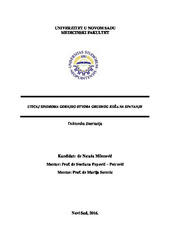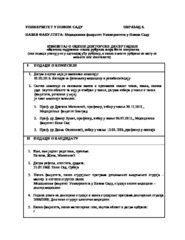Prikaz osnovnih podataka o disertaciji
Uticaj sindroma gornjeg otvora grudnog koša na spavanje
Impact of Thoracic Outlet Syndrome on Sleep
| dc.contributor.advisor | Semnic, Marija | |
| dc.contributor.advisor | Popović-Petrović, Svetlana | |
| dc.contributor.other | Devečerski, Gordana | |
| dc.contributor.other | Nađ, Čongor | |
| dc.contributor.other | Matanović, Dragana | |
| dc.contributor.other | Naumović, Nada | |
| dc.contributor.other | Lukač, Damir | |
| dc.creator | Milenović, Nataša | |
| dc.date.accessioned | 2016-10-08T15:47:33Z | |
| dc.date.available | 2016-10-08T15:47:33Z | |
| dc.date.available | 2020-07-03T13:28:58Z | |
| dc.date.issued | 2016-09-09 | |
| dc.identifier.uri | https://nardus.mpn.gov.rs/handle/123456789/6640 | |
| dc.identifier.uri | http://www.cris.uns.ac.rs/DownloadFileServlet/Disertacija145985545103346.pdf?controlNumber=(BISIS)100573&fileName=145985545103346.pdf&id=5278&source=NaRDuS&language=sr | sr |
| dc.identifier.uri | http://www.cris.uns.ac.rs/record.jsf?recordId=100573&source=NaRDuS&language=sr | sr |
| dc.identifier.uri | http://www.cris.uns.ac.rs/DownloadFileServlet/IzvestajKomisije145985545778853.pdf?controlNumber=(BISIS)100573&fileName=145985545778853.pdf&id=5279&source=NaRDuS&language=sr | sr |
| dc.description.abstract | Uvod - Etiologija sindroma gornjeg otvora grudnog koša (thoracic outlet syndrome- TOS) je udruženost više faktora koji su posledica narušavanja anatomsko-topografskih odnosa u nivou gornjeg otvora grudnog koša: kostoklavikularnog prostora, prednjeg skalenskog otvora, kao i same mehanike rebarnih zglobova i hrskavica, koji dovode do suženja prostora kroz koje prolaze neurovaskularne strukture, njihove kompresije, a samim tim i iritacije neurovaskularnih struktura. Sindrom gornjeg otvora grudnog koša je kompleks simptoma uzrokovanih kompresijom brahijalnog spleta, vene subklavije, arterije subklavije i simpatičkih vlakana, koji karakterišu bol, parestezije, mišićna slabost i osećaj nelagodnosti u ruci/rukama koji se pojačava podizanjem ruke/ruku ili prekomernim pokretima glave i vrata, te dovode do smanjenja funkcionalne sposobnosti ruke/ruku i poteškoća u obavljanju svakodnevnih aktivnosti. Pored toga imaju često izraženu tahikardiju, osećaj stezanja u grudima, glavobolju, vrtoglavicu, zujanje u ušima. Navedene tegobe su izraženije ponekad noću i dovode do poremećaja spavanja (problemi usnivanja, hrkanje, kašljanje, osećaj toplo/hladno, apnea, poremećaj dnevno/noćnog ritma- hronotipizacija, itd). Kao posledica lošeg spavanja moguća je pojava depresivnih simptoma. U raspoloživoj literaturi, spavanje i kvalitet spavanja se uglavnom posmatraju kroz prizmu drugih bolesti i stanja. Materijal i metode - Istraživanjem je obuhvaćeno ukupno 181 (sto osam deset jedna) osoba. Od tog broja 53 muškarca i 128 žena. Test grupu sačinjavalo je 82 ispitanika sa dijagnostikovanim TOS, a 99 zdravih osoba/osoba oba pola koji nemaju simptomatologiju TOS, je predstavljalo kontrolnu grupu. Grupe su bile ujednačene po polu i starosti (od 18 do 65). Tokom studije ispitanici su podvrgnuti kliničkom pregledu – fizikalnom i neurološkom pregledu. Pregled je podrazumevao pregled posture obolelog (posmatranje mišića regije vrata, ramena i ruku- trofika, tonus, konzistencija, mobilnost i kontraktilnost), posmatranje promena na koži (sa posebnim osvrtom na promene boje kože, trofičkih promena kože i noktiju i temperature kože ruku - šaka), testiranje refleksa, ispitivanje senzibiliteta u regijama inervacije odgovarajućih spinalnih korenova brahijalnog spleta. Takođe vršena je analiza stanja uhranjenosti (telesna visina, telesna masa, indeks telesne mase) i izvođenje provokativnih testova (Adson manevar, Rus test, Halsted test, Elvi test i Kostoklavikularni test). Kao deo ispitivanja obavljeno je i radiološko snimanje vratne kičme kao i pregled oscilografom. Ispitanici su imali za zadatak da ispune sledeće upitnike: Upitnik o nesposobnosti ruke, ramena i šake (DASH), Pitsburški indeks kvaliteta spavanja (PSQI), Upitnik o hronotipizaciji (MEQ), Bekov upitnik o depresiji (BDI II). Na kraju ispitanici su davali odgovore na pitanja iz vodiča za istraživača sastavljenog sa ciljem evaluacije različitih aspekata spavanja. Rezultati - Rezultati su pokazali da su upotrebljene skale dale zadovoljavajuću pouzdanost. Pokazalo se da osobe sa dijagnozom TOS pored bogate simptomatologije imaju još i probleme sa spavanjem. Analizom rezultata došlo se do zaključka da osobe sa dijagnozom TOS su starije, imaju više problema sa spavanjem i veću nesposobnost ruke, ramena i šake. Nije se pokazala razlika u hronotipizaciji kod osoba sa TOS u odnosu na kontrolnu grupu. Takođe može se zaključiti da osobe koje imaju izraženu nesposobnost ruku, ramena i šake imaju značajno veću šansu da imaju sindrom gornjeg otvora grudnog koša. Ove osobe pri tom imaju i veću šansu da razviju depresiju i poremećaj spavanja, te se zaključuje da ova dva parametra svoj uticaj na TOS ostvaruju preko problema sa funkcionisanjem ruke, ramena i šake. Dobar prediktor za postavljanje dijagnoze TOS može biti testiranje osoba DASH skalom. Zaključak - Rezultati studije mogu biti putokaz daljim istraživanjima, koja bi otvorila vrata formiranju protokola i opservaciji kvaliteta života osoba sa sindroma gornjeg otvora grudnog koša, sa posebnim osvrtom na poremećaje spavanja. | sr |
| dc.description.abstract | Etiology of thoracic outlet syndrome (TOS) is an association of several factors which are the result of disruption in the anatomical-topographical relations, in the level of superior thoracic aperture: costoclavicular space, anterior scalene aperture, as well as the mechanics of rib joints and cartilage, causing narrowing of space through which the neurovascular structures pass, their compression, and thus the irritation of neurovascular structures. Thoracic outlet syndrome is a complex of symptoms caused by the compression of the brachial plexus, subclavian vein, subclavian artery and sympathetic fibres, which is characterized by pain, parasthesias, muscle weakness and a feeling of discomfort in the arm / arms, which increases with raising the arm/arms or by excessive head and neck movements leading to a reduction of functional capabilities of the hands / arms and difficulties in everyday activities. In addition, patients often have expressed tachycardia, feeling of tightness in the chest, headache, dizziness, tinnitus. These problems are more pronounced at night and sometimes lead to sleep disorders (difficulty in falling asleep, snoring, coughing, feeling hot/cold, apnea, day/night rhythm disorder - Morningness/Eveningness disorder, etc.). As a result of poor sleeping depressive symptoms may occur. In the available bibliography, sleep and quality of sleep are mainly viewed through other diseases and conditions. The study included a total number of 181 (one hundred eighty one) people. Out of that 53 men and 128 women. The test group consisted of 82 patients diagnosed with TOS, and 99 healthy persons of both genders who had no symptoms of TOS, and constitute the control group. Groups were equalled by gender and age (18 to 65). Throughout the study subjects underwent clinical examination - both physical and neurological. This included an assessment of posture of the patient (observation of muscles in region of the neck, shoulders and arms - trophic, muscle tone, consistency, mobility and contractility), observation of changes on the skin (with a special emphasis on skin colour changes, trophic changes of the skin, nails and skin temperature of arms - hands), reflex testing, sensitivity testing in regions of innervations which correspond to spinal roots of the brachial plexus. Moreover, an analysis was conducted on the body composition analysis (body height, body weight, body mass index) as well as provocative tests (Adson manoeuvre, the Roos test, Halstead test, Elvy test and Costoclavicular test). Radiology scan of the cervical spine as well as oscillograph testing was conducted as a part of the test. The subjects were asked to fulfil the following questionnaires: Questionnaire on Disabilities of the Arm, Shoulder and Hand (DASH), Pittsburgh Sleep Quality Index (PSQI), The Morningness / Eveningness Questionnaire (MEQ), Beck Questionnaire on Depression (BDI II). Finally the subjects answered questions that researcher had drawn up in order to evaluate different aspects of sleep. The results showed that the scales used were reliable. It proved that persons diagnosed with TOS in addition to numerous symptoms also had problems with sleep. By analyzing the results it was concluded that people diagnosed with TOS are older, have more problems with sleep and greater disability of arms, shoulders and hands. There was no difference in Morningness/Eveningness type in patients with TOS in comparison to the control group. It can also be concluded that people who have pronounced disability of arms, shoulders and hands have a significantly greater chance of having thoracic outlet syndrome. These persons are more likely to develop depression and sleep disorders therefore those two entities impact TOS through the problems with the functioning of the arms, shoulders and hands. A good predictor in diagnosis of TOS may be testing people with DASH scale. The study findings can serve as a guideline for further research, opening the door into forming protocols and observation of the quality of life of people with the thoracic outlet syndrome, with special emphasis on sleep disorders. | en |
| dc.language | sr (latin script) | |
| dc.publisher | Универзитет у Новом Саду, Медицински факултет | sr |
| dc.rights | openAccess | en |
| dc.rights.uri | https://creativecommons.org/licenses/by-nc-nd/4.0/ | |
| dc.source | Универзитет у Новом Саду | sr |
| dc.subject | sindrom gornjeg otvora grudnog koša | sr |
| dc.subject | Thoracic Outlet Syndrome | en |
| dc.subject | Sleep | en |
| dc.subject | Arm | en |
| dc.subject | Hand | en |
| dc.subject | Neck Muscles | en |
| dc.subject | Surveys and Questionnaires | en |
| dc.subject | Sleep Wake Disorders | en |
| dc.subject | Depression | en |
| dc.subject | Comorbidity | en |
| dc.subject | spavanje | sr |
| dc.subject | ruka | sr |
| dc.subject | šaka | sr |
| dc.subject | mišići ramena | sr |
| dc.subject | ankete i upitnici | sr |
| dc.subject | poremećaji spavanja i budnosti | sr |
| dc.subject | depresija | sr |
| dc.subject | komorbiditet | sr |
| dc.title | Uticaj sindroma gornjeg otvora grudnog koša na spavanje | sr |
| dc.title | Impact of Thoracic Outlet Syndrome on Sleep | en |
| dc.type | doctoralThesis | en |
| dc.rights.license | BY-NC-ND | |
| dcterms.abstract | Поповић-Петровић, Светлана; Семниц, Марија; Девечерски, Гордана; Матановић, Драгана; Лукач, Дамир; Наумовић, Нада; Нађ, Чонгор; Миленовић, Наташа; Утицај синдрома горњег отвора грудног коша на спавање; Утицај синдрома горњег отвора грудног коша на спавање; | |
| dc.identifier.fulltext | http://nardus.mpn.gov.rs/bitstream/id/35630/Disertacija4714.pdf | |
| dc.identifier.fulltext | http://nardus.mpn.gov.rs/bitstream/id/35631/IzvestajKomisije4714.pdf | |
| dc.identifier.fulltext | https://nardus.mpn.gov.rs/bitstream/id/35631/IzvestajKomisije4714.pdf | |
| dc.identifier.fulltext | https://nardus.mpn.gov.rs/bitstream/id/35630/Disertacija4714.pdf | |
| dc.identifier.rcub | https://hdl.handle.net/21.15107/rcub_nardus_6640 |



